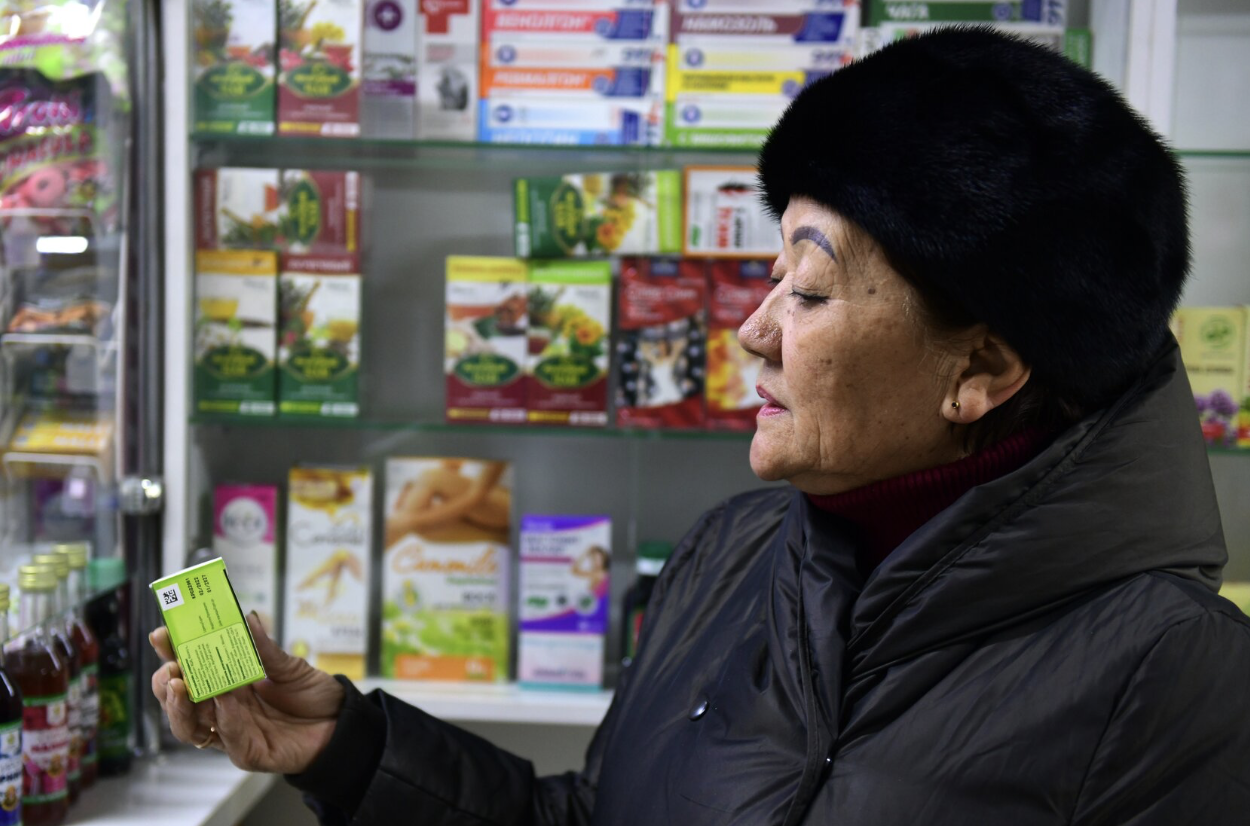Kyrgyzstan’s 2023 price regulation on essential medicines has made hypertension treatment more affordable for hundreds of thousands, improving financial protection. However, the recent introduction of VAT on medicines threatens these gains, prompting ongoing WHO-supported efforts to enhance access, affordability, and health outcomes through a long-term cooperation strategy with the Ministry of Health.
Ymyt Berdibekova, a 66-year-old pensioner from Bishkek, Kyrgyzstan, has experienced a significant improvement in managing her hypertension thanks to a recent government initiative to regulate medicine prices. Having battled hypertension for over 36 years, Ymyt used to spend nearly half of her monthly pension on medication, forcing her to work in a local shop to cover her basic needs. However, in 2023, the introduction of price controls on selected imported medicines, including those for noncommunicable diseases like hypertension, has made treatment more affordable for her and approximately 420,000 others in Kyrgyzstan. This government decree, enacted in May 2023, marked the first time the country implemented such price regulation on essential medicines, directly reducing the financial burden on patients reliant on these drugs.
Despite the positive impact of this price control mechanism, progress toward financial protection remains fragile. Recently, medicines were removed from the country’s value-added tax (VAT) exemption list, meaning that essential medicines are now subject to VAT. This change threatens to erode the financial gains achieved through price regulation, potentially increasing out-of-pocket expenses for patients like Ymyt. While the price controls continue to ensure the availability of lower-priced medicines, ongoing vigilance and advocacy are necessary to safeguard the population from renewed financial hardship.
This situation in Kyrgyzstan reflects a broader challenge across the WHO European Region, where out-of-pocket payments for outpatient medicines, medical products, and dental care remain major drivers of financial hardship. These services are often delivered in primary care settings, highlighting significant gaps in primary care coverage in many countries. In response, the World Health Organization (WHO) recommends that essential medicines be exempted from taxation and that such policies be designed to effectively lower medicine prices for patients and purchasers.
Since 2018, WHO, through its UHC Partnership, has collaborated closely with Kyrgyzstan’s Ministry of Health to improve the affordability of medicines for people living with noncommunicable diseases. This partnership is crucial to ensuring that accessing healthcare does not impose undue financial burdens, a cornerstone of Universal Health Coverage (UHC). The UHC Partnership operates in over 125 countries, benefiting more than 3 billion people worldwide, and is supported by a coalition of international donors including Belgium, Canada, the European Union, France, Germany, Ireland, Luxembourg, Japan, the United Kingdom, and WHO itself.
In November 2023, WHO and Kyrgyzstan’s Ministry of Health formalized their cooperation by signing a seven-year Country Cooperation Strategy for 2024–2030. This strategy targets seven strategic priority areas across all seven oblasts of Kyrgyzstan, with hypertension identified as the foremost priority. Building on the progress made through the UHC Partnership, the Ministry of Health and WHO aim to support more individuals like Ymyt in controlling their high blood pressure effectively without financial hardship.
Beyond improving individual health and financial protection, these efforts are expected to yield substantial economic benefits for Kyrgyzstan. Evidence indicates that the economic return on improved hypertension treatment outweighs the costs by a factor of approximately 18 to 1. Liviu Vedrasco, WHO Representative to Kyrgyzstan, emphasized that WHO’s work in the country is firmly focused on enhancing population health by reducing rates of undiagnosed and uncontrolled hypertension. Ensuring access to affordable, high-quality essential medicines is central to this mission, with the goal of reducing morbidity and mortality while accelerating broader health and developmental gains throughout Kyrgyzstan.
In summary, Kyrgyzstan’s recent price regulation on essential medicines represents a significant step toward financial protection and improved health outcomes for people with chronic conditions like hypertension. However, the introduction of VAT on medicines poses a risk to these gains, underscoring the need for continued policy vigilance and support. The ongoing collaboration between WHO and the Kyrgyz Ministry of Health through the UHC Partnership and the new Country Cooperation Strategy aims to strengthen healthcare access, affordability, and quality, ultimately fostering better health and economic prosperity for the nation.


